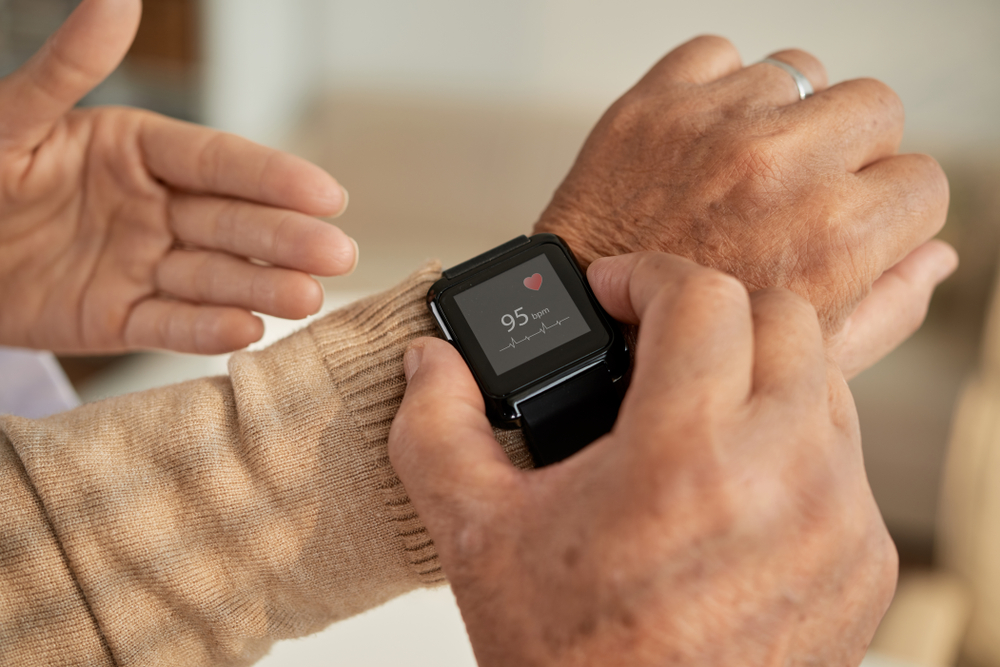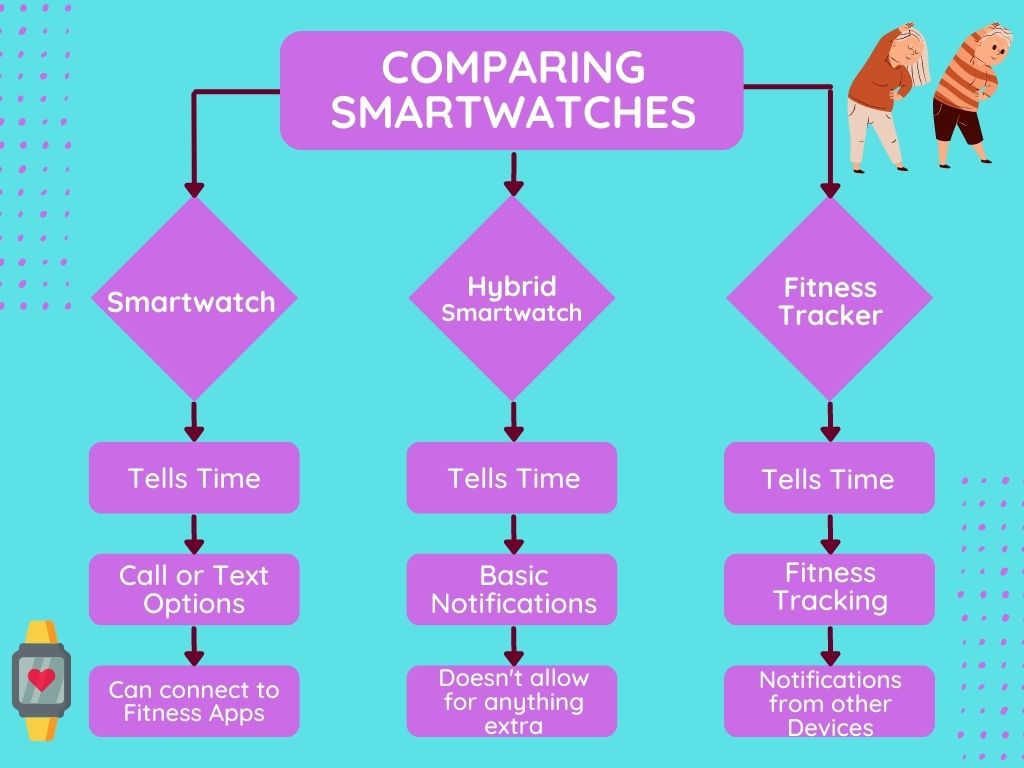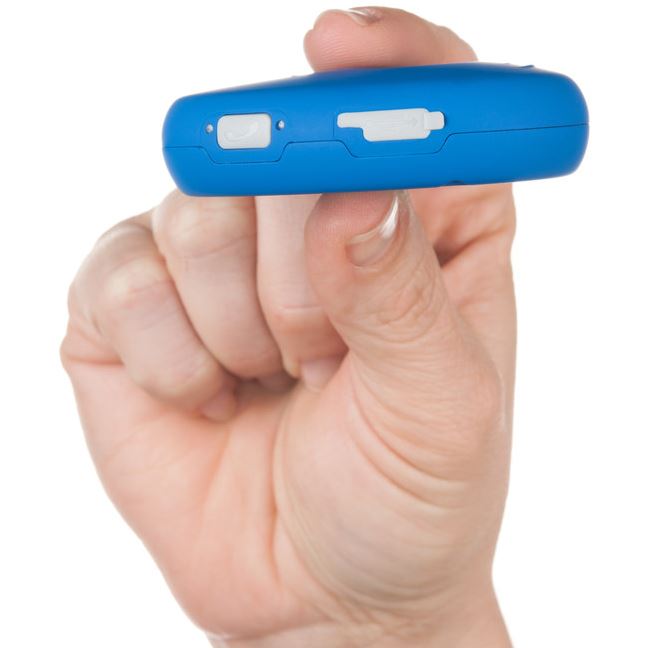 July 25, 2022
July 25, 2022
Remember: Prior to utilizing and depending on any device for medical purposes, you should consult with your physician to ensure the device will provide you with the accurate measurement to determine your health status. Accessible only recommends the CareCaller™.
With each year, more technology becomes available to us to make our lives easier. One of the most complex yet beneficial of these technologies is the smartwatch.
Smartwatches are used for daily activities, like health and fitness tracking. The more advanced smartwatches can do complex health tracking beyond counting steps and measuring the number of calories burned, including heart rate variability, steps, weight, food intake, and O2 stats.
All of these aspects make smartwatches and similar devices great tools for seniors and those with chronic illness because it allows them to be monitored for safety more acutely.
While new technology can sometimes be challenging, wearable devices allow people more access and control over their health and wellbeing.
Three Types of Smartwatches on the Market
Most smartwatches contain similar features but present them in different ways. Generally, there are three options to choose from regarding smartwatch technology.

First, there is the smartwatch. This device, to put it simply, is a step up from a basic time-telling watch. The smartwatch can look like a watch from a distance, but it actually uses some apps and gives alerts from your phone or another smart device.
Next, there is the hybrid smartwatch option. This option truly is the smartwatch at its most basic. The clock face only tells time – it doesn’t have a screen option for notifications. However, it can be programmed so that those notifications come to your watch via Bluetooth in the form of vibrations or time changes to signify specific contacts.
Finally, there is the fitness tracker quite a few wearers use, especially seniors. This option focuses mainly on tracking physical activity and monitors other health stats. The face of the device will tell you the time while also alerting you to various stats on healthcare.
So What Are the Benefits of Smartwatches?
Now that we’ve laid out the types of smartwatches available let’s dive into how this technology can benefit users. Some of these features may seem obvious, but smart technology offers wellness and safety benefits that are vital for those who need assistance monitoring their health.
Find My Phone – This feature is helpful for anyone, but especially for seniors who may struggle with misplacing items. This will allow them to send an alert to the phone, making it easier to find.
Reminders – This feature is ideal for helping with medication management. A reminder can be set on the smartwatch, and it will alert you when that time arrives.
Notifications – Much like the other features, this one utilizes the connection between device and phone. It will alert the wearer to any app notifications, calls, or texts that come through on the connected phone.
Sleep Monitoring – This one is especially useful for seniors because it uses your body vitals to track how long you sleep and whether or not the sleep was beneficial. This feature can alert the wearer to any disturbances their sleep cycle experiences.
Heart Rate – As mentioned above, smartwatches can be good for monitoring heart rate variability. This can come in handy if you are using your smartwatch as a fitness tracker first and foremost. It can also help relay information to your doctor as you go over your heart health.
Step Counter – This is the most basic feature that can be found on most smartwatches. It does what you think – it counts each step you take throughout the day and measures how far you’ve gone. This can be beneficial for tracking how active you are.
Calories – Along with counting steps, most smartwatches will also let you know how many calories you burned during your daily activity. This is a top benefit for those tracking their fitness and health progress through their devices.
Fall Detection – The more advanced smartwatch options are starting to have a feature that can detect when you have fallen and provide assistance through the device. Some devices can contact emergency assistance automatically if the wearer doesn’t respond, saving lives.
GPS – Some smartwatches are starting to have GPS capabilities. This comes in handy with the fall detection feature, allowing your emergency contact to know where you are. It can also prove beneficial when further tracking your physical activity, such as mapping out your walk or run.
Ultimately, what seniors are looking for is something that can keep them on track with their health. The question remains whether or not smartwatches can be helpful as medical alert devices.
Can a Smartwatch be a Medical Alert Device?
Technically, yes. Smartwatches can be a great asset for health and safety. They have many wellness and tracking features that users can customize to match their needs.
A smartwatch can be a great option if seniors want something to give them reminders, monitor their steps, or track their daily activities. A medical alert device is preferred for those who want a more immediate response to an emergency.
Exploring Smart Technology Options for Seniors: CareCaller™

Wearable devices are becoming more prevalent, as the surge in smartwatches shows. However, for some situations, a device dedicated purely to monitoring healthcare in the home is needed.
While smartwatches offer a holistic view of the wearer’s health, devices like CareCaller™ enable care teams to act swiftly in an emergency. A medical alerts device provides:
- Direct-to-caregiver call button
- Text messages and alerts to keep caregivers informed
- Fall alerts with adjustable sensitivity to prevent false alarms
- Call-in feature to perform wellness checks
- Innovative voice prompts to assist and reassure
- GPS to locate loved ones
- Optional 24/7 monitoring for peace of mind
Prior to utilizing and depending on any device for medical purposes, you should consult with your physician to ensure the device will provide you with the accurate measurement to determine your health status. Accessible only recommends the CareCaller™.
Contact us today to learn more about smart technology available for seniors or the Accessible CareCaller™ program.



